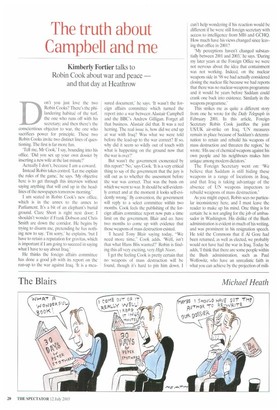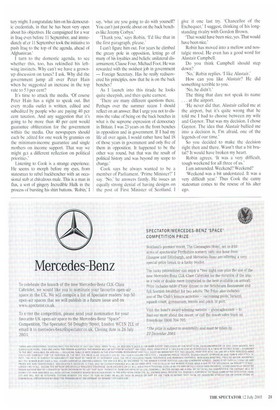The truth about Campbell and me
Kimberly Fortier talks to Robin Cook about war and peace — and that day at Heathrow Don't you just love the two Robin Cooks? There's the philandering habitué of the turf, the one who runs off with his secretary; and then there's the conscientious objector to war, the one who sacrifices power for principle. These two Robin Cooks invite two distinct lines of questioning. The first is far more fun.
'Tell me, Mr Cook,' I say, bounding into his office. Did you sex up your own dossier by inserting a new wife at the last minute?'
Actually I don't, because I am a coward.
Instead Robin takes control. 'Let me explain the rules of the game,' he says. 'My objective here is to get through this interview without saying anything that will end up in the headlines of the newspapers tomorrow morning.'
I am seated in Robin Cook's new office, which is in the annex to the annex to Parliament. It's a bit of an elephant's burial ground. Clare Short is right next door; I shouldn't wonder if Frank Dobson and Chris Smith are down the corridor. He begins by trying to disarm me, pretending he has nothing new to say. 'I'm sorry,' he explains, 'but I have to retain a reputation for gravitas, which is important if I am going to succeed in saying what I have to say about Iraq.'
He thinks the foreign affairs committee has done a good job with its report on the run-up to the war against Iraq. 'It is a mea
sured document,' he says. 'It wasn't the foreign affairs committee which turned the report into a war between Alastair Campbell and the BBC's Andrew Gilligan. Forget all that business. Alastair did that. It was a red herring. The real issue is, how did we end up at war with Iraq? Was what we were told before the lead-up to the war correct? If so, why did it seem so wildly out of touch with what is happening on the ground now that the war is over?'
But wasn't the government exonerated by this report? 'No,' says Cook. 'It is a very critical thing to say of the government that the jury is still out as to whether the assessment before the war was correct. That was the basis on which we went to war. It should be self-evidently correct and at the moment it looks self-evidently wrong.' By convention, the government will reply to a select committee within two months. Cook feels the publishing of the foreign affairs committee report now puts a time limit on the government. Blair and co. have two months to come up with evidence that those weapons of mass destruction existed.
'I heard Tony Blair saying today, "We need more time,Cook adds. 'Well, isn't that what Hans Blix wanted?' Robin is finding this all very exciting, very High Noon.
I get the feeling Cook is pretty certain that no weapons of mass destruction will be found, though it's hard to pin him down. I can't help wondering if his reaction would be different if he were still foreign secretary with access to intelligence from MI6 and GCHQ. How much have his views changed since leaving that office in 2001?
'My perceptions haven't changed substantially between 2001 and 2003,' he says. 'During my later years at the Foreign Office we were not nervous about the idea that containment was not working. Indeed, on the nuclear weapons side in '98 we had actually considered closing the nuclear file because we had reports that there was no nuclear-weapons programme and it would be years before Saddam could crank one back into existence. Similarly in the weapons programme.'
This strikes me as quite a different story from one he wrote for the Daily Telegraph in February 2001. In this article, Foreign Secretary Robin Cook justifies the joint US/UK air-strike on Iraq. 'UN measures remain in place because of Saddam's determination to retain and rebuild his weapons of mass destruction and threaten the region,' he wrote. 'His use of chemical weapons against his own people and his neighbours makes him unique among modem dictators.'
The Foreign Secretary went on: 'We believe that Saddam is still hiding these weapons in a range of locations in Iraq, and that Iraq is taking advantage of the absence of UN weapons inspectors to rebuild weapons of mass destruction.'
As you might expect, Robin sees no particular inconsistency here, and I must leave the reader to make up his mind. One thing is for certain: he is not angling for the job of ambassador in Washington. His dislike of the Bush administration is evident in much of his writing, and was prominent in his resignation speech. He told the Commons that if Al Gore had been returned, as well as elected, we probably would not have had the war in Iraq. Today he adds, 'I think that there are some people within the Bush administration, such as Paul Wolfowitz, who have an unrealistic faith in what you can achieve by the projection of mili tasty might. I congratulate him on his democratic credentials, in that he has been very open about his objectives. He campaigned for a war in Iraq even before 11 September, and immediately af.er 11 September took the initiative to push Iraq to the top of the agenda, ahead of Afghanistan.'
I turn to the domestic agenda, to see whether this, too, has rekindled his leftwing instincts. Why can't we have a grownup discussion on taxes? I ask. Why did the government jump all over Peter Hain when he suggested an increase in the top rate to 5 J per cent?
It's time to attack the media. 'Of course Peter HaM has a right to speak out. But every n't..dia outlet is written, edited and subedited by people who are paying 40 per cent taxation. And any suggestion that it's going to be more than 40 per cent would guarantee obliteration for the government within the media. Our newspapers should each be edited for one week by grannies on the minimum-income guarantee and single mothers on income support. That way we might get a different reflection on political Listening to Cook is a strange experience. He seerns to morph before my eyes, from statesman to rebel backbencher with an occasional stab at chivalrous male. This is a man in flux, a sort of gingery Incredible Hulk in the process of bursting his shirt buttons. 'Robin,' I say, 'what are you going to do with yourself? You can't just pootle about on the back benches like Jeremy Corbyn.'
'Thank you,' says Robin, 'I'd like that in the first paragraph, please.'
I can't figure him out, For years he climbed the greasy pole in opposition, letting go of many of his loyalties and beliefs: unilateral disarmament, Clause Four, Michael Foot. He was rewarded with the swishest job in government — Foreign Secretary'. Has he really rediscovered his principles, now that he is on the back benches'?
As I launch into this tirade he looks quite sheepish, and then quite earnest.
'There are many different questions there. Perhaps over the summer recess I should reflect on an answer. But I urge you not to dismiss the value of being on the back benches in what is the supreme expression of democracy in Britain. I was 23 years on the front benches in opposition and in government. If I had my life all over again, I would rather have had 18 of those years in government and only five of them in opposition. It happened to be the other way round, but that was the result of political history and was beyond my scope to change.'
Cook says he always wanted to be a member of Parliament. 'Prime Minister?' I say. 'No,' he answers firmly. He issues an equally strong denial of having designs on the post of First Minister of Scotland. I give it one last try. 'Chancellor of the Exchequer,' I suggest, thinking of his longstanding rivalry with Gordon Brown.
'That would have been nice, yes. That would have been nice.'
Robin has moved into a mellow and nostalgic mood. He even has a good word for Alastair Campbell.
Do you think Campbell should step down?
'No, Robin replies. 'I like Alastair.'
How can you like Alastair? He did something terrible to you.
'No, he didn't.'
The thing that dare not speak its name . at the airport.
'He never did that. Alastair called me at the airport, but it's quite wrong that he told me I had to choose between my wife and Gaynor. That was my decision. I chose Gaynor. The idea that Alastair bullied me into a decision is, I'm afraid, one of the legends of our time.'
So you decided to make the decision right then and there. Wasn't that a bit brutal? It would have broken my heart.
Robin agrees. 'It was a very difficult, tough weekend for all three of us.'
I am astounded. Weekend? Weekend?
'Weekend was a bit understated. It was a very difficult year.' Thus Cook the canny statesman comes to the rescue of his alter ego.



































































 Previous page
Previous page